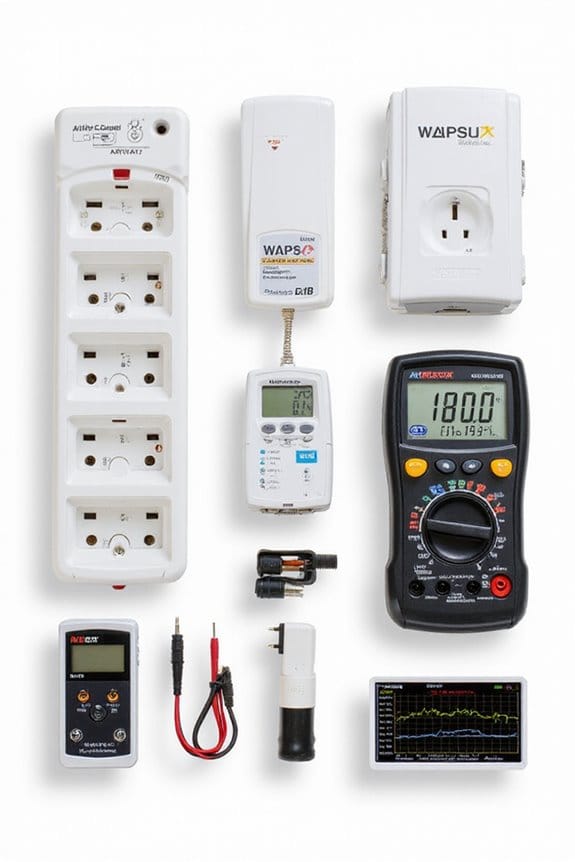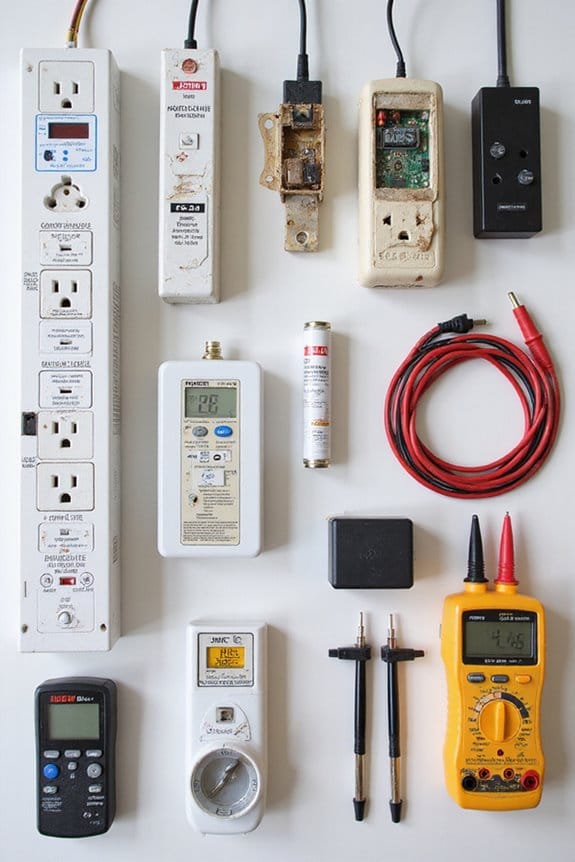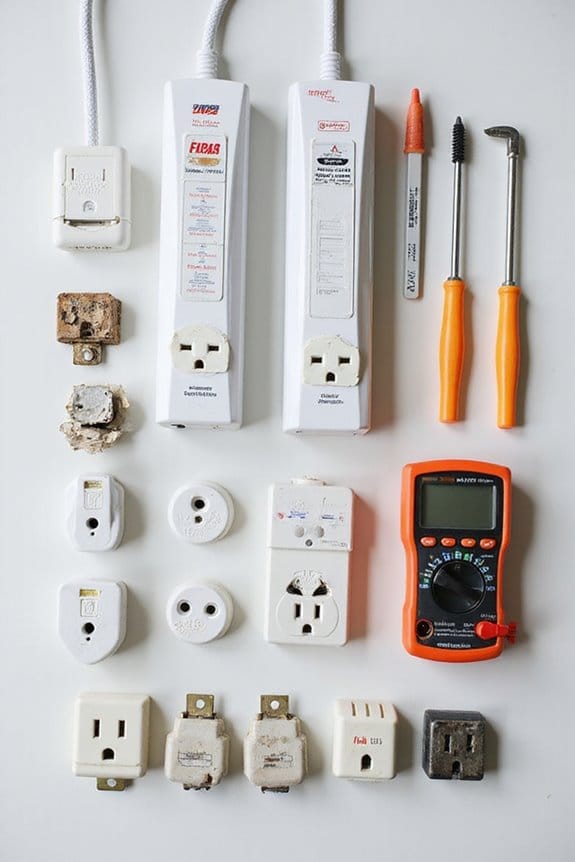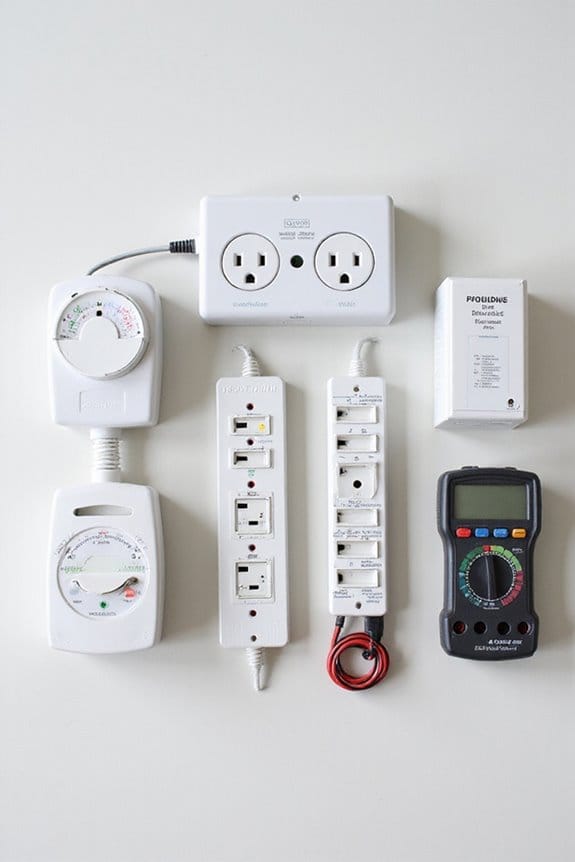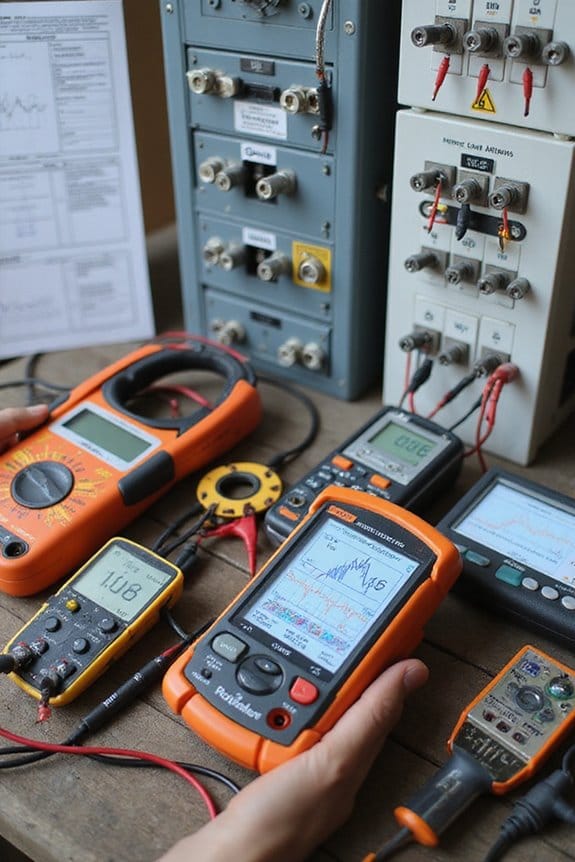Surge protectors primarily shield your devices from voltage spikes, but they don’t do much for line noise. Number one, most surge protectors focus on voltage protection. Number two, some advanced models claim noise filtering features. However, if you’re dealing with sensitive electronics, I suggest looking into line conditioners. They work wonders at tackling noise interference. So, if you’re curious about the best options and how to protect your gear, there’s more to uncover!
Key Takeaways
- Surge protectors primarily prevent voltage spikes, not specifically designed for line noise reduction.
- Some high-quality surge protectors include features that filter electromagnetic and radio frequency interference.
- The effectiveness of noise reduction varies among surge protector models, with advanced models offering better suppression.
- Sensitive equipment may require line conditioners for optimal noise filtering beyond what surge protectors provide.
- Regular replacement of surge protectors is necessary to maintain effective protection against both surges and noise.
Understanding Surge Protectors and Their Primary Function
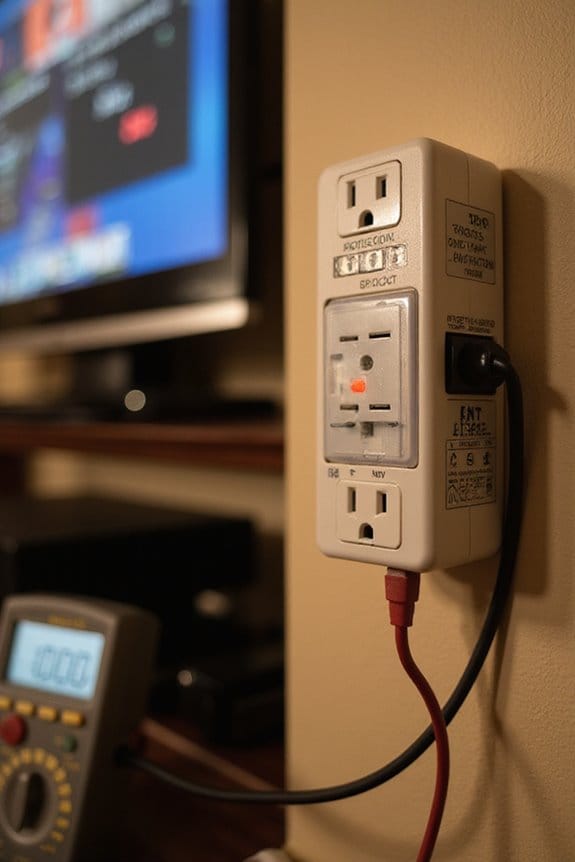
When it comes to protecting our valuable electronics, surge protectors are like the unsung heroes of the electrical world. So let’s explore some surge protector basics.
- Purpose: They’re designed to prevent damage from voltage spikes, which can happen due to lightning or large appliances.
- How They Work: Surge protectors monitor voltage levels and divert excess voltage to the ground, ensuring your devices stay safe.
- Components: Key players include Metal Oxide Varistors (MOVs) and Gas Discharge Tubes (GDTs) that absorb those pesky surges.
The Relationship Between Surge Protectors and Line Noise
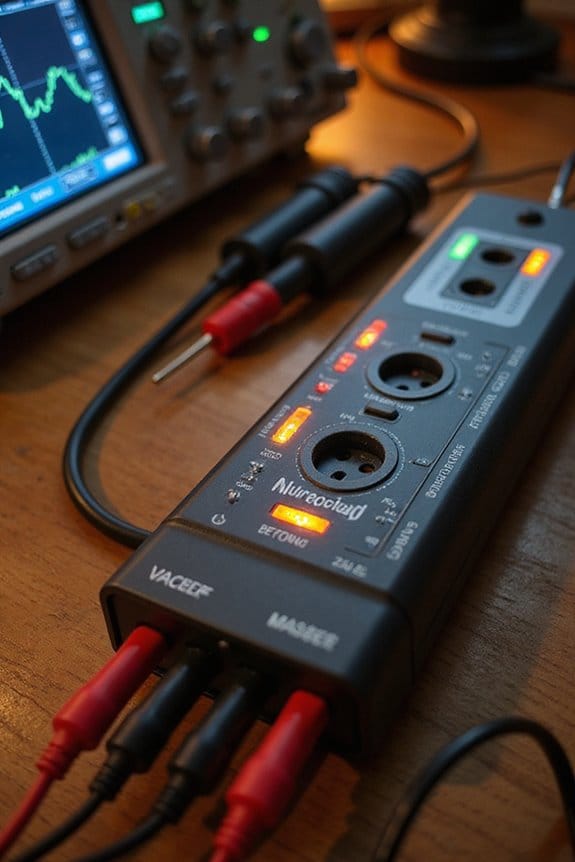
Surge protectors do a fantastic job at safeguarding our devices from dangerous voltage spikes, but they aren’t always the go-to solution for line noise issues. Here’s the scoop:
- Surge Protection Focus: Their main role is to prevent voltage surges, not to tackle noise interference.
- Noise Filtering Features: Some models have isolated filter banks that can reduce certain types of line noise. However, not all surge protectors offer this.
- Effectiveness Varies: If you’re dealing with sensitive equipment, consider line conditioners instead. They provide better noise filtering and voltage regulation.
In my experience, while surge protectors can offer some noise reduction, they’re not a magic bullet for line noise. So, choose wisely based on your needs!
Types of Surge Protectors With Noise Filtering Features
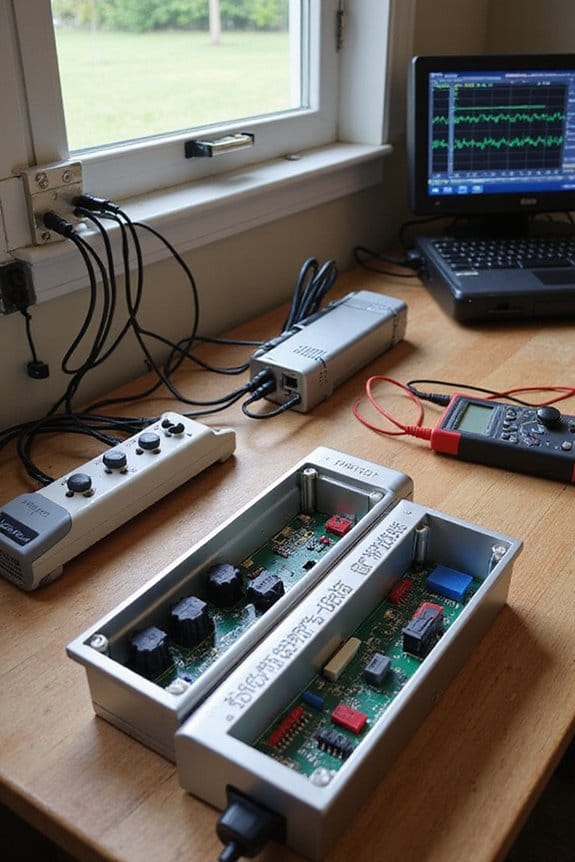
Not all surge protectors are created equal, especially when it comes to noise filtering features. Here are some surge protector types you might consider:
- Basic Surge Protectors: These focus on voltage spikes, with little to no noise filtration technologies. They’re the simplest option.
- EMI/RFI Filter Surge Protectors: These add electromagnetic and radio frequency interference filtering, improving noise reduction considerably.
- Isolated Filter Banks: These provide enhanced noise filtration by isolating equipment sections, blocking cross-interference from devices like printers.
- Advanced Models: Some incorporate sophisticated technologies like Furman’s LiFT for superior noise and surge suppression. Additionally, selecting a surge protector with advanced features can enhance the overall protection of your electronics.
Choosing the right type can make a real difference in protecting your electronics from pesky line noise!
Sources and Impact of Line Noise on Electronics
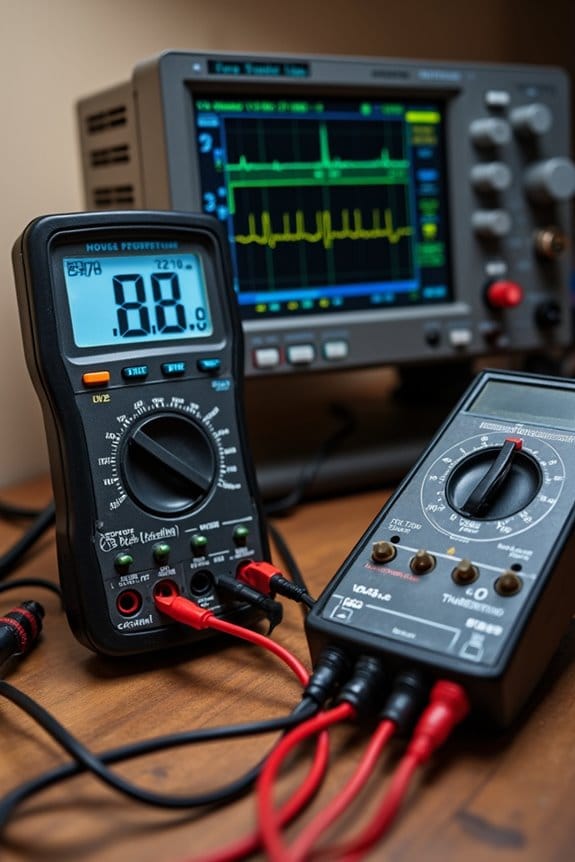
Line noise might seem like a pesky inconvenience, but it can seriously mess with your electronics. Here’s what you need to know about its sources and impact:
- Power-Line Disturbances: Arcing from utility equipment or nearby high-power devices creates noise. Yikes!
- Electrical Interference: Switching appliances on and off can cause transient spikes that disrupt your gadgets.
- Natural Events: Lightning storms can induce surges, leading to unwanted noise.
The effects? You might encounter glitches in your software or even physical damage to hard drives. Visual displays could flicker, while audio systems may sound worse. In short, line noise isn’t just annoying; it can degrade your device’s performance and reliability. So, keeping an eye on your electrical environment is a smart move!
Comparing Surge Protectors and Line Conditioners
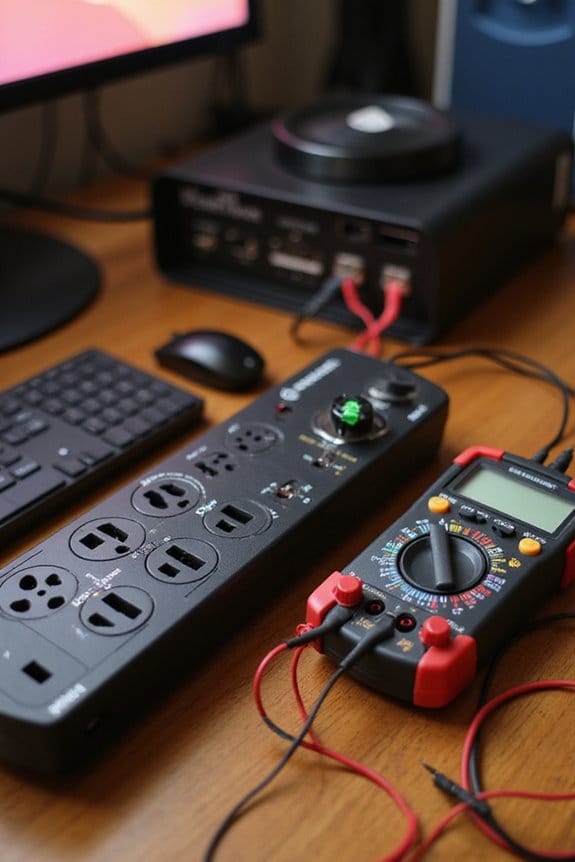
When it comes to protecting our precious electronics from line noise and voltage spikes, it’s important to know the options available. Here’s a quick comparison:
- Surge Protectors: Great for basic protection against high voltage spikes, but they have limitations. They don’t consistently filter noise or regulate voltage, which can leave your devices vulnerable.
- Line Conditioners: These are the overachievers! They stabilize voltage, filter electrical noise, and offer surge protection all in one. Their advantages include continuous monitoring and a cleaner power supply, making them ideal for sensitive electronics.
While surge protectors serve everyday devices well, line conditioners justify their cost by providing thorough protection. If you’re serious about safeguarding your gear, consider investing in a line conditioner. Trust me, your devices will thank you!
Technical Metrics Related to Surge Protection and Noise Filtering
Understanding the technical metrics related to surge protection and noise filtering can seem a bit intimidating, but don’t worry—I’m here to break it down for you. Here are some key points to examine:
- Transient Suppression: Look for surge protectors with low initial clamping voltage (around 150 Volts AC RMS) for quick response.
- Noise Filtration Ratings: Effective filtering technology typically achieves around 40 dB noise reduction, ensuring your devices stay shielded from interference.
- EMI/RFI Benefits: High-frequency suppression can exceed 80 dB, targeting annoying electrical noise that can disrupt your equipment.
- Joule Ratings: Make sure to check these ratings (like 900J) to know how much surge energy a protector can handle.
Practical Considerations for Selecting Surge Protectors
Selecting the right surge protector can feel like an intimidating task, especially with so many options out there. Here are some practical considerations to simplify your choice:
- Surge Protector Compatibility: Make sure the protector matches your electrical system’s voltage and frequency. If it doesn’t, you might be in for some surprises—none of them good!
- End of Life Indicators: Look for models with these indicators. They signal when it’s time to replace the unit, saving you from unexpected failures.
- Risk Assessment: Assess your area’s lightning risk. Areas with high activity need more robust protection.
The Efficacy of Noise Filtering in Surge Protectors
While it might seem like a small detail, the efficacy of noise filtering in surge protectors can make a huge difference for your electronics. Here’s why:
- Reduced Interference: Noise filtering helps eliminate annoying audio static and video disturbances caused by line noise. It’s like giving your devices a breath of clean air!
- Improved Surge Performance: High-quality surge protectors with noise filtering can enhance overall performance, especially for sensitive audio and video equipment.
- Targeted Action: These filters focus on electromagnetic interference (EMI) and radio frequency interference (RFI), not voltage regulation.
- User Experiences: Many folks report clearer sound and fewer disruptions after using noise-filtering surge protectors.
Recommendations for Sensitive Electronics and Line Noise Management
If you’re looking to protect your sensitive electronics from line noise, you’re in the right place! Here are my top recommendations for effective surge protection and line noise management:
- Choose Quality Surge Protectors: Look for units with low clamping voltage and high joule ratings. This guarantees better protection against surges and line noise.
- Consider Line Conditioners: These guys do it all—regulating voltage and filtering noise, making them perfect for high-end electronics.
- Use Isolated Filter Banks: They help reduce interference by isolating sensitive devices from noise-producing equipment.
- Regularly Replace Protectors: Over time, surge protectors can degrade. Keeping them fresh guarantees continued protection.
- Invest in Quality Tools: Using high-quality electrical tools like Klein Tools Hand Tool Kit can enhance your overall electrical setup, ensuring safer installations and maintenance.
Frequently Asked Questions
Can Surge Protectors Improve Audio Quality by Reducing Line Noise?
I’ve found that surge protectors don’t really improve audio quality by reducing line noise in my audio equipment. They mainly protect against voltage spikes, but dedicated power conditioners are better for enhancing sound clarity.
How Can I Identify Surge Protectors With Noise Filtering Features?
When I choose surge protectors, I always look for key product features like noise filtering capabilities. Terms like “isolated filter banks” or “EMI/RFI filtering” really catch my attention and indicate better performance for my needs.
Do Surge Protectors Have a Lifespan That Affects Their Noise Reduction Capabilities?
Like a sponge soaking up water, a surge protector’s lifespan affects its noise reduction effectiveness. Over time, it wears out, losing the ability to filter noise, so I replace mine every few years for ideal protection.
What Types of Devices Benefit Most From Surge Protectors With Noise Filtering?
I’ve found that devices like amplifiers, gaming consoles, and computers really benefit from surge protectors with noise filtering. Power conditioning helps minimize electrical interference, enhancing sound quality and performance while protecting my valuable equipment from damage.
Can Multiple Surge Protectors Be Used Together for Better Noise Reduction?
When it comes to noise management, I wouldn’t recommend using multiple surge protectors together. They often lack surge compatibility, potentially causing more issues than they solve. It’s better to choose a single high-quality unit for effective noise reduction.

